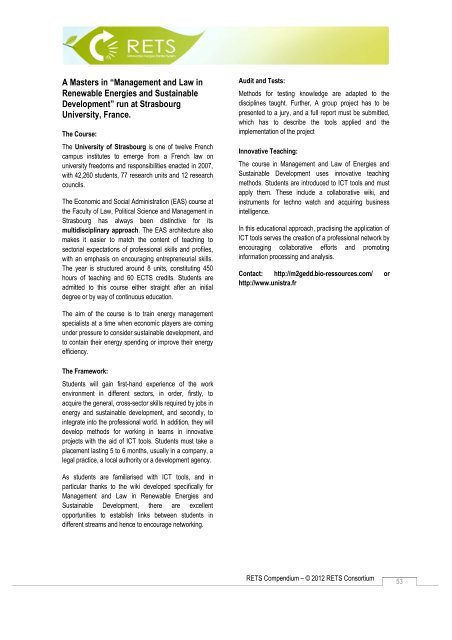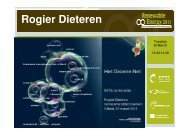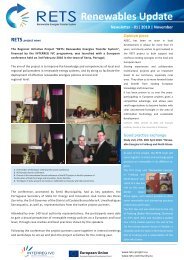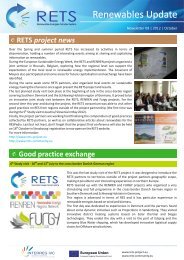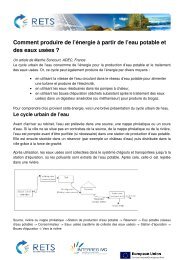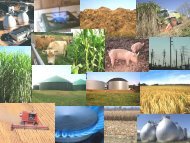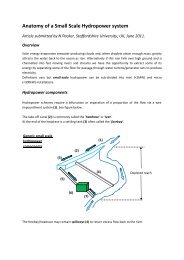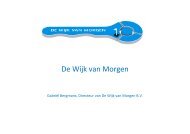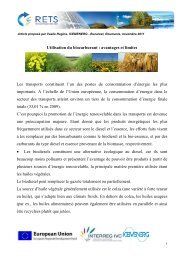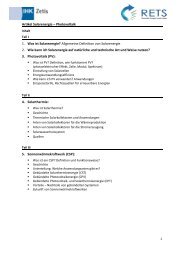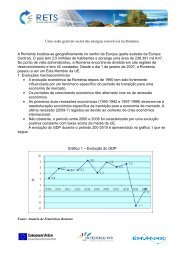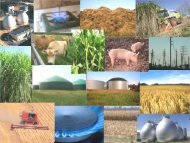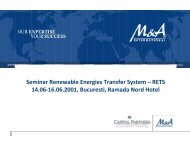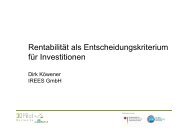Promoting renewable energies - RETS Project
Promoting renewable energies - RETS Project
Promoting renewable energies - RETS Project
Create successful ePaper yourself
Turn your PDF publications into a flip-book with our unique Google optimized e-Paper software.
A Masters in “Management and Law in<br />
Renewable Energies and Sustainable<br />
Development” run at Strasbourg<br />
University, France.<br />
The Course:<br />
The University of Strasbourg is one of twelve French<br />
campus institutes to emerge from a French law on<br />
university freedoms and responsibilities enacted in 2007,<br />
with 42,260 students, 77 research units and 12 research<br />
councils.<br />
The Economic and Social Administration (EAS) course at<br />
the Faculty of Law, Political Science and Management in<br />
Strasbourg has always been distinctive for its<br />
multidisciplinary approach. The EAS architecture also<br />
makes it easier to match the content of teaching to<br />
sectorial expectations of professional skills and profiles,<br />
with an emphasis on encouraging entrepreneurial skills.<br />
The year is structured around 8 units, constituting 450<br />
hours of teaching and 60 ECTS credits. Students are<br />
admitted to this course either straight after an initial<br />
degree or by way of continuous education.<br />
Audit and Tests:<br />
Methods for testing knowledge are adapted to the<br />
disciplines taught. Further, A group project has to be<br />
presented to a jury, and a full report must be submitted,<br />
which has to describe the tools applied and the<br />
implementation of the project<br />
Innovative Teaching:<br />
The course in Management and Law of Energies and<br />
Sustainable Development uses innovative teaching<br />
methods. Students are introduced to ICT tools and must<br />
apply them. These include a collaborative wiki, and<br />
instruments for techno watch and acquiring business<br />
intelligence.<br />
In this educational approach, practising the application of<br />
ICT tools serves the creation of a professional network by<br />
encouraging collaborative efforts and promoting<br />
information processing and analysis.<br />
Contact: http://m2gedd.bio-ressources.com/ or<br />
http://www.unistra.fr<br />
The aim of the course is to train energy management<br />
specialists at a time when economic players are coming<br />
under pressure to consider sustainable development, and<br />
to contain their energy spending or improve their energy<br />
efficiency.<br />
The Framework:<br />
Students will gain first-hand experience of the work<br />
environment in different sectors, in order, firstly, to<br />
acquire the general, cross-sector skills required by jobs in<br />
energy and sustainable development, and secondly, to<br />
integrate into the professional world. In addition, they will<br />
develop methods for working in teams in innovative<br />
projects with the aid of ICT tools. Students must take a<br />
placement lasting 5 to 6 months, usually in a company, a<br />
legal practice, a local authority or a development agency.<br />
As students are familiarised with ICT tools, and in<br />
particular thanks to the wiki developed specifically for<br />
Management and Law in Renewable Energies and<br />
Sustainable Development, there are excellent<br />
opportunities to establish links between students in<br />
different streams and hence to encourage networking.<br />
<strong>RETS</strong> Compendium – © 2012 <strong>RETS</strong> Consortium<br />
53


